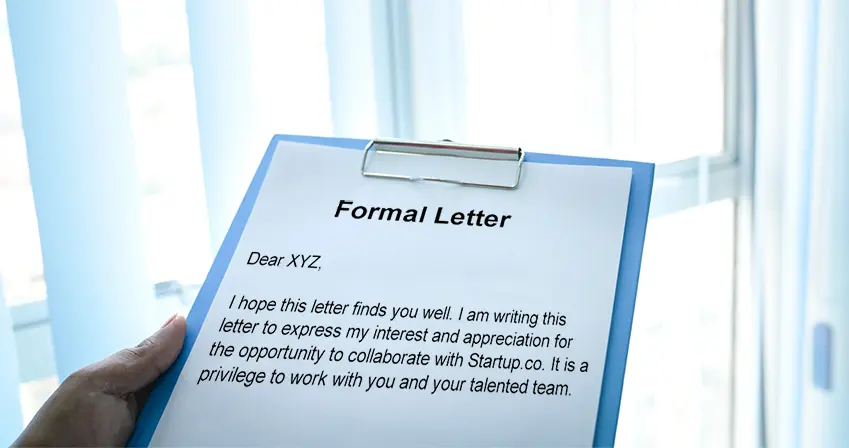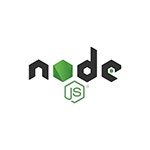
We will notify you once we have something for you
Get the best experience of Shine at your fingertips.
9am - 6pm, Mon to Sat

Formal letters are an important part of the professional communication. Having a comprehensive knowledge of the formal letter format and structure will help you in structuring one efficiently. The well-structured and formatted letter will help you in conveying your concerns.
In the corporate workspace, you will need to draft an appropriate official letter at every step, from writing a job application to sending a resignation letter. Henceforth, you need to master these skills to thrive in the corporate workspace. Read the blog to get the formal letter format, samples, and tips that will help you create a professional letter.
It is a mode of communication that is written for official purposes. It is written courteously and professionally to express concerns, appreciation, and give information. It is used for various purposes in educational and professional settings. The formal letter format is not followed while writing a letter to a personal acquaintance.
The reasons for writing a formal letter are not restricted to the corporate workspace. There are various other reasons for which the letter can be written such as:
Registering a complaint for the malfunction of a product or complaining about a team.
Writing a letter to enquire about a process, a function, or a product.
Structuring an effective cover letter for job application.
Writing a letter to thank someone for their contributions or thanking them for acknowledging your efforts for the work.
The importance of formal letters in the professional workspace cannot be overstated. They are essential tools of professional communication. The points mentioned below will help you in analysing the importance of formal letters.
Legal Validity: It is an important document in agreements and discussions, as it serves as a piece of legal evidence.
Record Keeping: These are the official documents maintaining the records. Whether for leaves, joining the company, or resignation, these documents are essential for maintaining a record of all the important activities.
Official Documentation: Some government organisations need formal letters for approvals, documentation, requests, etc.
Check here the types of formal letters that are essential for corporate and business communications.
Job Application Letters: These letters are used to fill out the applications for the vacant positions in the company. This is the first line of communication between you and the prospective employer, so it should be written professionally and formally.
Resignation Letters: These are drafted to inform your employer about your decision to depart from your current role. You must mention your last working day and other needed information.
Recommendation Letters: It is written by the supervisor to the employee to reinstate their confidence in their abilities and recommend their candidature for future employment.
Apology Letters: These letters are written to express your regret for the inconvenience caused due to an error or mistake. These should follow an extremely polite way of writing and must also mention the steps taken to avoid such instances in the future.
Invitation Letters: The invitation letters are structured to invite the esteemed guests to an event. It should contain complete information about the event, address, and other important details
Thank you Letters: These letters are a way of expressing your gratitude and appreciation for their efforts or maybe saying thank you for acknowledging your efforts.
Letters of Enquiry: These are written to enquire about a product, or service or to collect important data.
Letters of Complaint: It is used to express your concerns regarding the service, product, or behaviour of the company. There can be various reasons for writing a complaint letter.
Certain elements need to be considered when writing a formal letter. Check out the list of the important points that need to be present to ensure you are following the right formal letter format.
Sender’s Details
You can start the letter by mentioning your complete contact information. Write it at the top left corner of the letter. This will help the recipient to identify you and reply to the letter.
Date
Mention the date below your contact information. Use the full date format to avoid confusion. Date is an important part of the letter as it helps in tracking it and keeping a record of it.
Recipient Details
Add complete details of the recipient. You must add all the relevant details such as company name, organisation name, etc. It is important to include the correct details of the recipient and make sure you have checked it twice.
Salutation
You should start the letter by formally greeting the recipient. You can write Sir or Madam to address them professionally. If the recipient is an acquaintance then you can use their names like Dear Mr. John Smith or Ms. Sakshi Aggrawal. Ideally, you should use the full name of the recipient or the last name. This adds a personal touch to the letter maintaining professionalism.
If you do not know the recipient as in the case of a job application letter, you can mention Dear Recruiter, or opt for a gender-neutral salutation.
Subject Line
Add a concise and to-the-point subject line below the salutation. This line defines the purpose of the letter. It should be clear and highly relevant and immediately let the recipient know the reason for writing the letter.
Body of the Letter
Segment the body of the letter into several paragraphs. Each paragraph of the formal letter should define a reason and should have a purpose. You must organise your thoughts clearly, concisely, and coherently. Do not use overly complicated words or language.
Complimentary Closing
End the letter with a professional closing. You can use words such as “Sincerely”, “Best Regards” or “Yours Faithfully” for closing statements. After that, add your name, job title, and signature.
You must have realised the importance of mastering the art of writing a well-structured formal letter. The tips below will help you polish your letter and leave a positive impression on the recipient.
A right formal letter format not only helps you in conveying the information, approval, or concerns in a structured manner but also displays your written communication skills. Check out the valuable tips that have been provided below:
Know your Audience: The target audience plays an important role in determining the structure of your letter. Analyse your audience and then structure the letter accordingly.
Clear and Concise: The formal letter should convey the information concisely. Avoid using ambiguous and vague language.
Follow the Format: Adhere to the specified formal letter format. Ensure following the right format.
Right Tone: A formal letter should always be written in a highly professional tone. Avoid using overly formal language.
Do Formatting: Consider spacing, fonts, and margins to make sure that it looks professional and neat.
Add Contact Information: Do not forget to include your contact information and other relevant details. This will help the recipient reach out to you immediately.
You must have realised what to do, not take note of what not to do to ensure a professional formal letter format.
Avoid writing stories: The formal letters should be up to the point. Exclude exaggeration or irrelevant stories. It will make your letter look unprofessional.
Do not use jargon or technical language: Avoid using complex language in the formal letter. Keep it as simple as possible.
Avoid Using Abbreviations: The professional letter should comprise clear statements and facts. Try to avoid using abbreviations and acronyms, this will make the letter look unprofessional.
Avoid Excessive Personal Details: You must not add overly personal information that is not related to the matter.
Sender’s Name
Sender’s Address
Recipient’s Name
Recipient’s Job Title
Recipient’s Address
Dear [Recipient’s Name]
Subject: Concise and to the point subject line
[Body paragraphs of the Letter]
Yours Sincerely,
[Your Name]
[Designation]
[Employee ID]
You must have understood the importance of writing a formal letter in a structured format. An example of the letter has been provided for you below:
[Your Name]
[Your Address]
[City, State, Zip Code]
[Your Phone Number]
[Your Email Address]
[Date]
[Recipient’s Name]
[Recipient’s Title]
[Company/ Organisation Name]
[Recipient’s Address]
[City, State, Zip Code]
Dear XYZ,
I hope this letter finds you well. I am writing this letter to enquire about the [purpose of enquiry]. Our team at [Company Name] is currently working on a project where the insights from a leading firm like yours would be of great help.
Moreover, I would highly appreciate it if you could help us with structuring the data efficiently and provide us with valuable references that can serve the purpose. Your expertise in this area would be of high value to us.
Thank you for your attention to this matter. I am eagerly looking forward to your response.
Sincerely,
[Full Name]
[Job Title]
Many different samples for the formal letters have been provided below:
Resignation Letter
[Your Name]
[Your Address]
[City, State, Zip Code]
[Your Phone Number]
[Your Email Address]
[Date]
[Recipient’s Name]
[Recipient’s Title]
[Company/ Organisation Name]
[Recipient’s Address]
[City, State, Zip Code]
Dear [Recipient’s Name],
I am writing this letter to formally resign from my position as [Job Title] at [Company Name], effective [Last Working Day, typically two weeks from the date of the letter].
My time at the [Company Name] has been invaluable. I am highly grateful for the growth and learning opportunities that I have received here. I have had the privilege of working on some crucial projects that have honed my skills and helped me grow professionally.
After thorough consideration, I have decided to pursue a different career path. I would like to convey my heartfelt appreciation for your support and guidance, which has helped me contribute to the success of the team.
In the coming weeks, I am committed to ensuring a smooth transition before my departure. I will make sure that all my pending tasks are completed.
Thank you once again for the opportunity to be a part of an incredible team. I am taking ahead a wealth of knowledge and good memories. I am looking forward to staying in touch with you, please do not hesitate to contact me at [Your Contact Information] and [Email ID].
Sincerely,
[Your Full Name]
[Your Position]
Apology Letter
[Your Name]
[Your Address]
[City, State, Zip Code]
[Your Phone Number]
[Your Email Address]
[Date]
[Recipient’s Name]
[Recipient’s Title]
[Company/ Organisation Name]
[Recipient’s Address]
[City, State, Zip Code]
Dear [Recipient’s Name],
I am writing this letter to extend my sincere apologies for [mention the reason]. I completely understand the impact my actions may have had on [write about the loss or the feelings of the concerned person]. Kindly know that it was not intentional, and I deeply regret the inconvenience caused.
I ensure taking accurate steps to avoid the recurrence of such incidents in the future. I will take care of the [mention the steps that you will take to avoid the mistake]. Kindly accept my apology. Your understanding in this regard will be of high value to me. I hope we keep the positive relationship intact.
Once again I apologise for the inconvenience and am dedicated to rebuilding the trust.
Sincerely,
[Your Name]
Recommendation Letter
[Your Name]
[Your Address]
[City, State, Zip Code]
[Your Phone Number]
[Your Email Address]
[Date]
[Recipient’s Name]
[Recipient’s Title]
[Company/ Organisation Name]
[Recipient’s Address]
[City, State, Zip Code]
Dear [Recipient’s Name],
I am writing this letter to highly recommend [Candidate’s Name] for future opportunities. As her [supervisor, manager, and colleague] I have absolute confidence in her abilities to scale the business growth efficiently through her rich skill set.
During her tenure in [Company’s Name], she has shown a remarkable performance. I had the privilege to work with her in [name of the project] and was highly impressed by her ability to [mention about a specific skill, or project.]
One of her greatest strengths is that she has high problem-solving skills, decision-making skills, and efficient communication skills. Her attributes have contributed immensely to the success of the team.
I am confident that her skills and personality will be an asset to any organisation she decides to join. If you have any further questions, please do not hesitate to reach out at [Contact Numbe] and [Email Address].
Sincerely,
[ Full Name]
[Designation]
[Company Name]
Invitation Letter
[Your Name]
[Your Address]
[City, State, Zip Code]
[Your Phone Number]
[Your Email Address]
[Date]
[Recipient’s Name]
[Recipient’s Title]
[Company/ Organisation Name]
[Recipient’s Address]
[City, State, Zip Code]
Dear [Recipient’s Name],
I am writing this letter to cordially invite you to the event [name of the event] which will be held on [date of the event], at [venue/ location]. Kindly grace the occasion with your presence.
The event will demonstrate [mention the complete details of the event]. It will be graced by the presence of eminent personalities including [name of the personalities who will preside over the event].
We are highly enthusiastic to welcome you to the event. Your participation in the same will contribute immensely to the success of the team. If you have any further queries about the event, please do not hesitate to contact [Name of the concerned person] at [Contact Number] and [Email ID].
We are enthusiastic and eager to host you in the event.
Sincerely,
[Full Name]
[Job Profile]
[Company Name]
Cover Letter
[Your Name]
[Your Address]
[City, State, Zip Code]
[Your Phone Number]
[Your Email Address]
[Date]
[Recipient’s Name]
[Recipient’s Title]
[Company/ Organisation Name]
[Recipient’s Address]
[City, State, Zip Code]
Dear [Recipient’s Name],
I am writing this letter to express my keen interest in the [Job Profile] at [Company Name]. I learned about this position through an advertisement on the specified [Job Portal]. I have completed my Bachelor’s in [Subject Name] from the [University Name].
I have also gained x years of experience working in this field. I am confident that my skills and experience align with the role and I will be able to contribute to the success of the team.
I have gained proficiency in the [mention relevant skills as needed for this role]. In my current role, I have worked on [name of the projects] which has helped me further hone and develop my technical skills in this domain.
I am particularly attracted to [mention about a special skill or role], that aligns with my work ethic. I am highly enthusiastic about the opportunity to bring my skills and expertise to the table.
I am enthusiastic to be a part of the team. Enclosing my resume along with the letter for your reference, it provides complete details about my background and qualifications.
I am looking forward to the opportunity to discuss how my experience and qualifications can help contribute to the success of your organisation. To discuss the position further, please do not hesitate to contact me at [Phone Number] and [Email ID].
Sincerely,
[Full Name]
[Job Title]
[Company Name]
Thank You Letter
[Your Name]
[Your Address]
[City, State, Zip Code]
[Your Phone Number]
[Your Email Address]
[Date]
[Recipient’s Name]
[Recipient’s Title]
[Company/ Organisation Name]
[Recipient’s Address]
[City, State, Zip Code]
Dear [Recipient’s Name],
I am writing to extend my sincerest gratitude for the opportunity to interview for the position at [specific position] at [Company Name]. I highly appreciate the time and opportunities that your team has invested in discussing the position further.
I am particularly impressed by the [mention specific skills, insightful questions, and team’s professionalism]. It was an enlightening conversation that helped me know more details about the role.
I want to extend my deepest gratitude and appreciation for the opportunity. I am looking forward to being a part of the team and bringing my expertise to the table. Should you have any questions or enquiries, please feel free to contact me at [Contact Number] and [Email ID].
Thank you once again for the opportunity, and I am looking forward to the possibility of working together.
Warm Regards,
[Full Name]
[Signature]
Letter of Complaint
[Your Name]
[Your Address]
[City, State, Zip Code]
[Your Phone Number]
[Your Email Address]
[Date]
[Recipient’s Name]
[Recipient’s Title]
[Company/ Organisation Name]
[Recipient’s Address]
[City, State, Zip Code]
Dear [Recipient’s Name],
I hope this letter finds you well. I am writing this letter to express my concerns regarding our recent business communication.
For the previous few weeks, I have been noticing that there is a delay in response times to my emails and calls whenever I am trying to reach out to your team. As a result, it is becoming highly difficult for me to coordinate projects and address urgent matters on time.
Frequent communication and feedback are important in our work. These delays are causing disruptions in the workflow and even have led to missing deadlines.
Moreover, there have been many incidents where important information has been neglected or misunderstood. To cater to the prevailing issues, I would highly appreciate it if we could schedule a meeting to discuss the issues.
I am dedicated to finding solutions that can be beneficial for both of us and am open to all the suggestions and feedback you may have.
Thank you for your attention to this matter, and I look forward to resolving these issues together.
Sincerely,
[Full Name]
[Job Title]
Reply to a Letter of Complaint
[Your Name]
[Your Position/Title]
[Company Name]
[Company Address]
[City, State, Zip Code]
[Your Email Address]
[Your Phone Number]
[Date]
[Customer's Name]
[Customer's Address]
[City, State, Zip Code]
Dear [Customer's Name],
Thank you for expressing your concern and bringing this crucial matter to our attention. We offer our most sincere apologies for the inconvenience caused. Your feedbacks are highly appreciated and we have taken the necessary measures to address these and resolve the prevailing concerns.
We want you to know that your satisfaction is our top-most priority, and we highly regret the inconvenience caused. Thank you for your patience and understanding. We would like to extend [discount, offer, cashback, etc] as a token of our appreciation for your continued support and trust in us.
If you have any other concerns or feedback, kindly do not hesitate to contact us directly. We are dedicated to providing you the top-notch services and reestablishing the trust and confidence you have in us.
Sincerely,
[Full Name]
[Job Position]
You must have realised the importance of mastering the art of writing a well-structured formal letter. The tips below will help you polish your letter and leave a positive impression on the recipient.
A well-written formal letter not only helps you in conveying the information, approval, or concerns in a structured manner but also displays your written communication skills. Check out the valuable tips that have been provided below:
Clear and Concise: The formal letter should convey the information and should be concise and to the point. Avoid using ambiguous and vague language.
Follow the Format: Adhere to the specified format of the letter. It should be written professionally and formally.
Right Tone: A formal letter should always be written in a highly professional tone. Avoid using overly formal language.
Do Formatting: Consider spacing, fonts, and margins to make sure that it looks professional and neat.
Q1. What is the difference between formal and informal letters?
The formal letters have a professional and formal tone, whereas the informal letters are written in a casual tone. The former follows a properly structured format, on the other hand, the latter follows a free-flowing format.
Q2. What is a formal letter also known as?
The formal letters are also known as Business Letters or Professional letters. These letters follow a specific format. These letters are used for official purposes.
Q3. What are the features of the formal letter?
The formal letters include the sender’s and recipient's addresses and flow in a structured format. It includes a professional tone and respectful language. It has a clearly defined subject line and the body of the letter is followed by a complimentary closing.
Q4. What should not be included in a formal letter?
Some points must not be included in a formal letter the points are listed below:
Informal Language
Abbreviations
Overly long sentences
Negativity or blame
Q5. What are the common formatting styles for formal letters?
Formal letters typically adhere to one of two formatting styles: semi-block style and block style. In semi-block style, the sender's address, date, recipient's address, and salutation are aligned to the right, while the body of the letter is aligned to the left with a slight indent for each paragraph.
On the other hand, block style features all elements aligned to the left, with no indentation for paragraphs, creating a clean and straightforward look. Both styles maintain a professional appearance, with the choice between them often depending on personal preference or organizational guidelines.


Duration: 51 Hours|Mode: Online

Duration: 20 Hours|Mode: Online

Duration: 41 Hours|Mode: Online